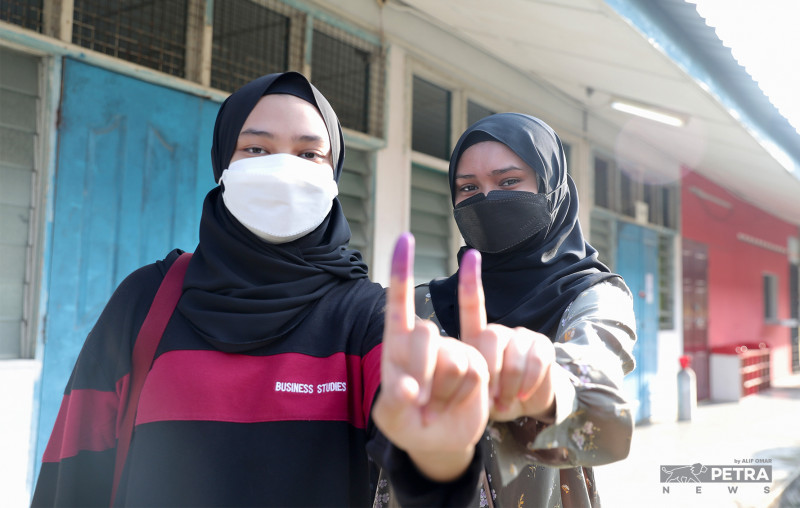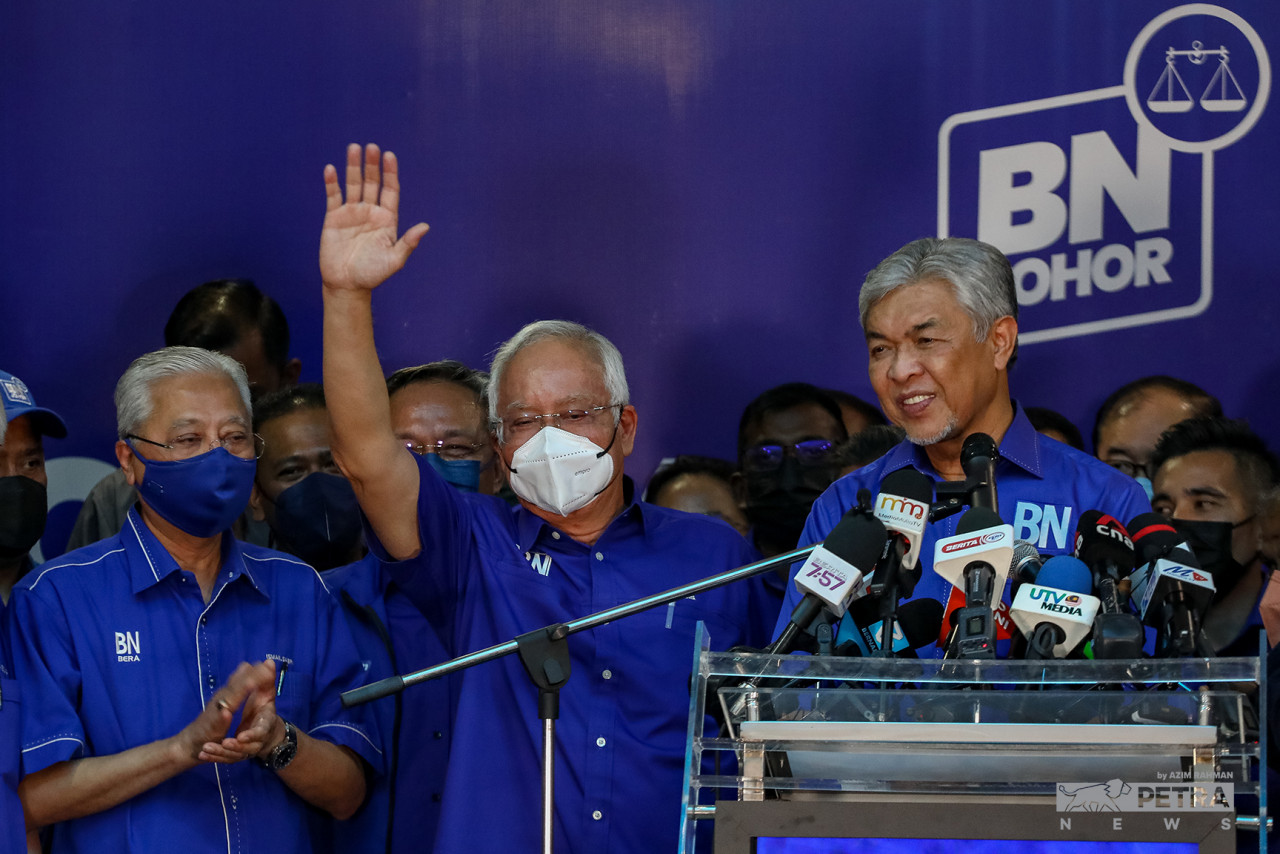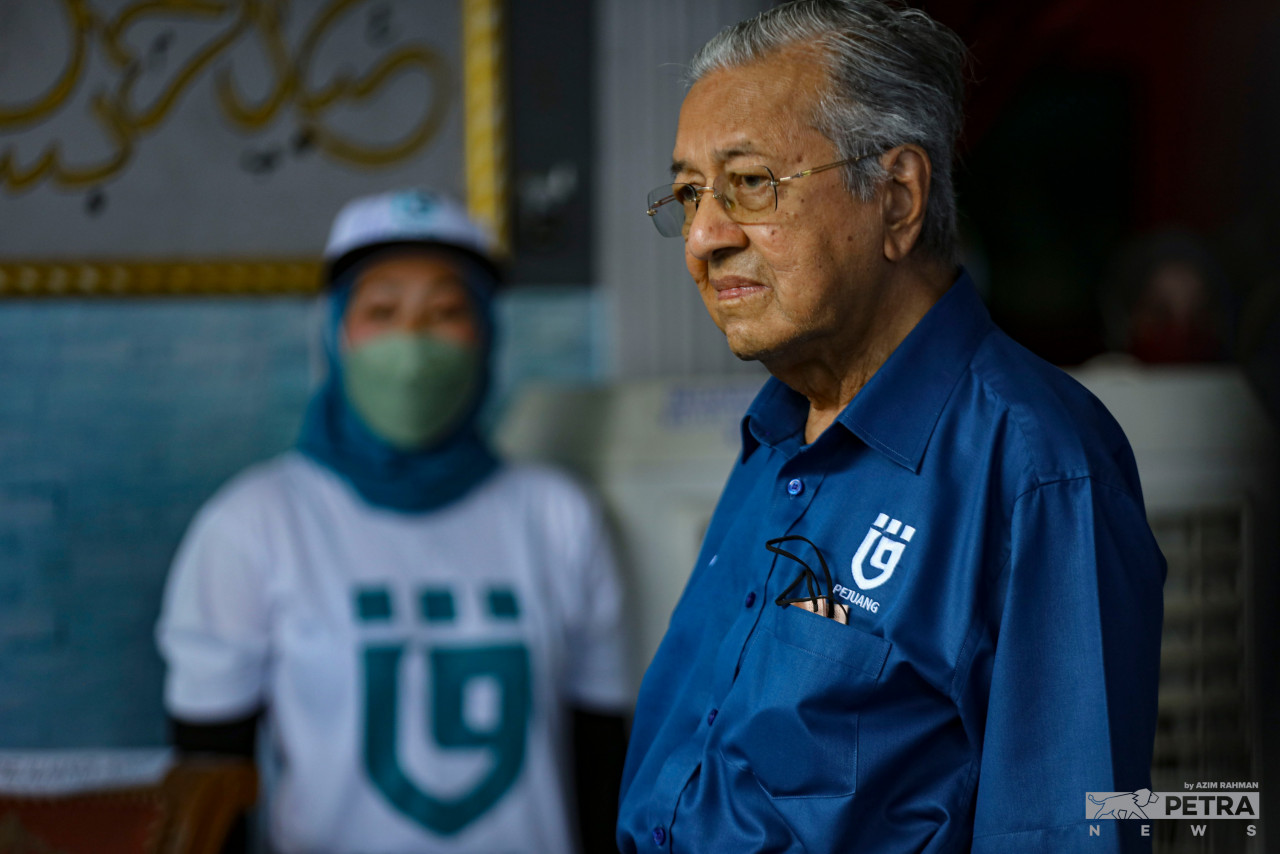Low voter turnout not to blame for Pakatan’s Johor defeat: observers
Analysts note fractious opposition, multi-cornered fights, Umno’s machinery as key to landslide Barisan Nasional win

Azmi Hassan says it is unfair to compare the 50% voter turnout yesterday to the 65% and 70% seen in the recent elections in Melaka and Sarawak because Johor saw nearly 800,000 new voters due to Undi18. – ALIF OMAR/The Vibes pic, March 13, 2022
KUALA LUMPUR – Low voter turnout in the Johor election yesterday is not the reason behind Pakatan Harapan’s (PH) defeat to Barisan Nasional (BN), said political observers.
Instead, the analysts pointed to fractious relationships within the opposition coalition, as well as the involvement of newer players such as Pejuang, Warisan, and Muda in a myriad of multi-cornered fights.
Azmi Hassan, a political observer from Universiti Teknologi Malaysia, told The Vibes that it was unfair to compare the 50% voter turnout yesterday to the 65% and 70% seen in the recent elections in Melaka and Sarawak because Johor saw nearly 800,000 new voters due to Undi18.
“If you make a very crude calculation and take away the new voters, you would find it equivalent to a 65% overall voter turnout (seen in the previous election).”
“PH’s loss in the state cannot be blamed on the voter turnout. The blame lies with PKR, DAP, and Amanah who are not on the same frequency, as well as other opposition parties such as Pejuang, Warisan, and Muda.
“What transpired in Melaka also happened in Johor whereby PKR’s supporters did not vote for DAP and Amanah and vice-versa. PH had given BN a free ticket for its landslide win.”
Azmi said BN’s victory was not leveraged from the popularity of former prime minister Datuk Seri Najib Razak and his “bossku” personality, but rather PH’s own failings and weaknesses in facing multi-cornered fights.
He added that this was due to the opposition parties being scattered, with candidates overlapping in some seats and refusal to operate as a single and cohesive unit.
“With the likes of Pejuang, Warisan, and Putra joining the fold, it's not so much the Najib factor but a disenfranchised opposition that allowed BN’s landslide victory.”

Azmi Hassan says Barisan Nasional’s victory was not leveraged from the popularity of former prime minister Datuk Seri Najib Razak (centre) and his ‘bossku’ personality, but rather Pakatan Harapan’s own failings and weaknesses in facing multi-cornered fights. – AZIM RAHMAN/The Vibes pic, March 13, 2022
On Pejuang’s dismal performance, Azmi said the newly formed party helmed by former prime minister Tun Dr Mahathir Mohamad should not have contested in the election.
He said using Dr Mahathir as Pejuang’s main icon was a “wrong strategy” because the veteran leader was not favoured in Johor.
“During his (Dr Mahathir’s latest) tenure, there was a rough relationship between the prime minister and the Johor palace, so it was the wrong choice to contest and their supporters must be devastated.
“They (Pejuang) will have to think hard for the next general election as they made the wrong strategic decision by contesting in 42 seats compared to the six contested by Warisan. They must think of whether it is wise to go solo in GE15.”
Singapore Institute of International Affairs senior fellow Oh Ei Sun, who shared Azmi’s sentiments, said although a higher turnout would have seen PH win several more seats, BN would have been able to mobilise its many supporters to come out and vote.
Oh also said PH and PKR were also likely to trump its decision to contest with separate flags in an attempt to sidetrack from the previous string of losses, especially in Melaka and Sarawak.
“The bossku (factor) enhanced BN’s chances but is of course not the definitive factor in their victory. Umno’s tremendous ground machinery was key.
“It would appear that without partnering with PH, and having split from Bersatu, it is difficult for Pejuang to go it alone.”
As for the upcoming general elections and the possibility of DAP and PKR parting ways, Oh said the current allies could still retain a semblance of PH.
“The key, though, is not to overlap their seats.”
On Pejuang’s dismal performance, Azmi said the newly formed party helmed by former prime minister Tun Dr Mahathir Mohamad should not have contested in the election.
He said using Dr Mahathir as Pejuang’s main icon was a “wrong strategy” because the veteran leader was not favoured in Johor.
“During his (Dr Mahathir’s latest) tenure, there was a rough relationship between the prime minister and the Johor palace, so it was the wrong choice to contest and their supporters must be devastated.
“They (Pejuang) will have to think hard for the next general election as they made the wrong strategic decision by contesting in 42 seats compared to the six contested by Warisan. They must think of whether it is wise to go solo in GE15.”
Singapore Institute of International Affairs senior fellow Oh Ei Sun, who shared Azmi’s sentiments, said although a higher turnout would have seen PH win several more seats, BN would have been able to mobilise its many supporters to come out and vote.
Oh also said PH and PKR were also likely to trump its decision to contest with separate flags in an attempt to sidetrack from the previous string of losses, especially in Melaka and Sarawak.
“The bossku (factor) enhanced BN’s chances but is of course not the definitive factor in their victory. Umno’s tremendous ground machinery was key.
“It would appear that without partnering with PH, and having split from Bersatu, it is difficult for Pejuang to go it alone.”
As for the upcoming general elections and the possibility of DAP and PKR parting ways, Oh said the current allies could still retain a semblance of PH.
“The key, though, is not to overlap their seats.”

Azmi Hassan says using Tun Dr Mahathir Mohamad as Pejuang’s main icon was wrong, because the veteran leader is not favoured in Johor. – AZIM RAHMAN/The Vibes pic, March 13, 2022
Whatever King Minus touched upon, FOREX, Maminco, Mukawasa, BMF, Proton, Crooked Bridge, Perwaja, A.R.E, Civil Service, Judiciary, Senate, UMNO, UMNO II, Pakatan, PRIBUMI Bersatu, etc, it turned to sh*t
Meanwhile, Universiti Sains Malaysia’s Azmil Tayeb, believed PH had “screwed up” its messaging in the Johor campaign by touching on issues such as corruption, kleptocracy, and returning the mandate instead of policies that focused on bread-and-butter issues.
Azmil said a higher turnout might have favoured PH, but its supporters appeared to be fatigued with infighting and fragmentation within the opposition, hampering their motivation to vote.
The academic, however, believed that Najib’s influence had little to do with the BN’s win.
Instead, he opined that there was a perception among voters that things were economically better during BN’s reign in Johor, especially with regards to jobs, food prices, and various subsidies.
Azmil also believed that Dr Mahathir has lost influence among voters in general.
“It’s clear that Tun M is no longer relevant and voters don’t see how he and his party are able to offer something different than the rest.”
He also said that PH would not split “if they had enough sense in them”.
“Malaysia’s first-past-the-post system is unfavourable to multi-cornered contests. There’s strength in unity, especially in pooling resources and coming up with cohesive messaging,” he said.
The Election Commission confirmed BN’s supermajority after the coalition clinched 40 out of the total 56 seats in the Johor assembly.
In its official results, PH clinched 11 seats, PN won three constituencies, while youth-led Muda and PKR secured one seat each. – The Vibes, March 13, 2022
Whatever King Minus touched upon, FOREX, Maminco, Mukawasa, BMF, Proton, Crooked Bridge, Perwaja, A.R.E, Civil Service, Judiciary, Senate, UMNO, UMNO II, Pakatan, PRIBUMI Bersatu, etc, it turned to sh*t
Meanwhile, Universiti Sains Malaysia’s Azmil Tayeb, believed PH had “screwed up” its messaging in the Johor campaign by touching on issues such as corruption, kleptocracy, and returning the mandate instead of policies that focused on bread-and-butter issues.
Azmil said a higher turnout might have favoured PH, but its supporters appeared to be fatigued with infighting and fragmentation within the opposition, hampering their motivation to vote.
The academic, however, believed that Najib’s influence had little to do with the BN’s win.
Instead, he opined that there was a perception among voters that things were economically better during BN’s reign in Johor, especially with regards to jobs, food prices, and various subsidies.
Azmil also believed that Dr Mahathir has lost influence among voters in general.
“It’s clear that Tun M is no longer relevant and voters don’t see how he and his party are able to offer something different than the rest.”
He also said that PH would not split “if they had enough sense in them”.
“Malaysia’s first-past-the-post system is unfavourable to multi-cornered contests. There’s strength in unity, especially in pooling resources and coming up with cohesive messaging,” he said.
The Election Commission confirmed BN’s supermajority after the coalition clinched 40 out of the total 56 seats in the Johor assembly.
In its official results, PH clinched 11 seats, PN won three constituencies, while youth-led Muda and PKR secured one seat each. – The Vibes, March 13, 2022
No comments:
Post a Comment